How do you sustainably increase fresh herb availability? That is the question Upfarm got to work answering and thus introduced a unique cultivation concept for in-store and restaurant cultivation. "We bring technology and the fresh, local, and experience trends together," says owner Lode Lauwers.
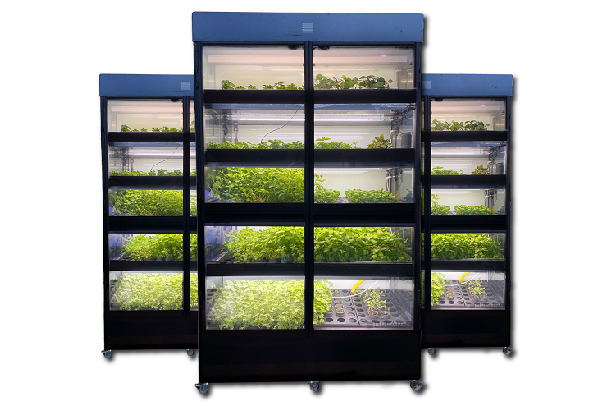
The greenhouses have their own microclimate that is maintained year-round.
Lode and his sister, Eveline started Upfarm. They came up with the idea during the pandemic. The pair wanted to increase the availability of fresh leafy vegetables, herbs, and cresses using modular greenhouses. Their passion for herbs is not strange; their father and uncles run the Belgian family business, Vegobel.
This company grows an extensive range of fresh herbs in pots. "We grew up in horticulture; it was instilled in us," says Lode. "COVID-19 taught us the importance of local products. Also, I was keen to combine technology with a good story. And that's how Upfarm came about."
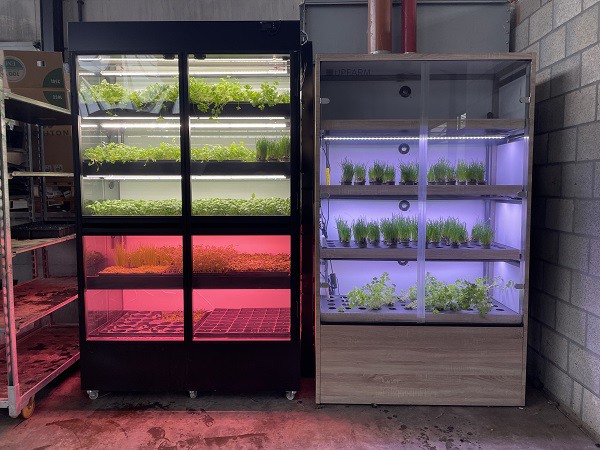 The modular vertical greenhouse for in-store and restaurant farming.
The modular vertical greenhouse for in-store and restaurant farming.
Super fresh and full experience
Upfarm has now partnered with Metro, a European hospitality and food professional wholesale group. This group’s Antwerp store grows fresh herbs in a greenhouse of some 20m2. "The herbs are grown and distributed directly in the store. Local restaurant owners and chefs can add herbs harvested in the morning to their dishes that same day."
"It’s a unique example of instore farming. There is a different selection of herbs available every month. These are a mix of well-known basic herbs and more unusual and exotic kinds. We find that chefs are always pleasantly surprised with they visit the greenhouse," Lode continues.
To make this concept widely accessible, Upfarm has designed a smaller version - the modular, vertical greenhouse. It measures just one square meter, allowing for in-store and restaurant farming. "You could compare it to growing produce in your garden or on your terrace, just year-round. Everything in the greenhouse is adjusted to everything else so the plants can grow under perfect conditions."
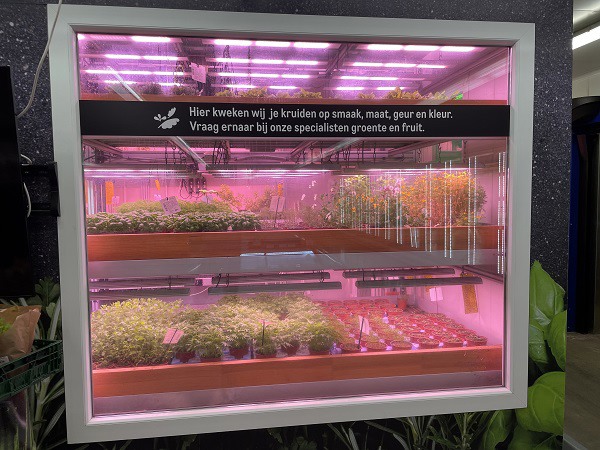 “We increase fresh herb availability by bringing them to the end-user, so to speak,” says Lode.
“We increase fresh herb availability by bringing them to the end-user, so to speak,” says Lode.
"Think of herbs, cresses, leafy vegetables, edible flowers, and so on. You can set up our greenhouses anywhere, and you can bring the products to the end-user, as it were, instead of the other way around. How great would it be for chefs to cut edible flowers, ultra-fresh from the greenhouse, just before serving, while guests watch? That's the full experience," says Lode.
No unnecessary packages or food waste
That it can be placed anywhere is this modular greenhouse’s advantage. So, users can pick herbs only when they are needed. "You can't get fresher, and the highest possible antioxidants and vitamin content are guaranteed. The products are grown locally, so you also don't have to throw anything away. And there’s no unnecessary packaging. Also, thanks to the greenhouse’s optimal conditions, you can grow the products pesticide-free. All the herbs are safe and ready for immediate use."
Upfarm can be used in retail as well as foodservice. Retailers deem shelf life and availability particularly important. The product range is always adapted to the customer's wishes. "For retail clients, that's often a standard herb assortment. We alternate those with special varieties so people can try out new products, which triggers consumption. Restaurant owners want inspiration; everything has to be super-fresh, flavorful, and shelf-stable," explains Lode.
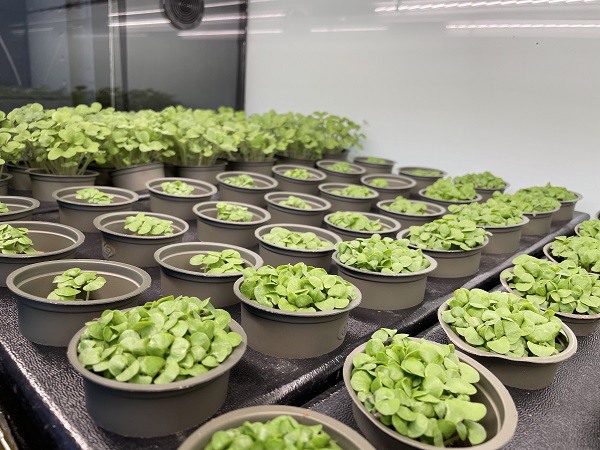 Upfarm’s local-for-local production decreases herbs’ environmental pressure.
Upfarm’s local-for-local production decreases herbs’ environmental pressure.
"The hospitality industry’s offer is often customized. We discuss the menu with the chefs and offer matching products. Those are frequently the somewhat more unusual herbs, sprouts, edible flowers, and seasonal toppers. Currently, it's mostly stews using the more classic herbs such as thyme, oregano, and parsley, and lots of special kinds of coriander. And soon, the greenhouses will be full of edible flowers and herbs for salads and cocktails again."
Local-for-local
Businesses can use the modular greenhouse to distinguish themselves. "It’s a unique eye-catcher with added value. And because of the high production rotation, it's profitable too. The special feature, of course, is the entire cultivation process experience. Consumers, chefs, and retailers can watch the product grow; it’s literally right there and so consumption is boosted. We consider its sustainable character enormously important. We don't fly the herbs in; we work with local products," Lode says.
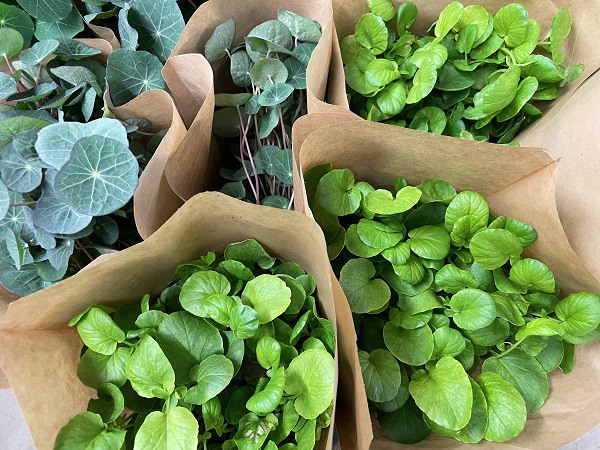
"We germinate many ourselves or have that done at Vegobel. The herbs are placed, newly sprouted, in the greenhouse where their flavor, leaf size, and aroma continue to increase.” Upfarm is currently primarily active in Belgium, particularly in Antwerp. Other Belgian cities will follow, and they are planning talks with various parties in the Netherlands and Germany. “We want to collaborate with different herb suppliers to supply customers as locally as possible."
The Upfarm greenhouse can be placed anywhere, but Lode sees especially good opportunities for cities. "Consumption is high there, while there’s no space for cultivation. There are a few small city and roof gardens initiatives, but year-round cultivation is simply impossible," declares Lode. "Our greenhouses have their own microclimate that’s maintained 365 days/year. By strategically placing these cultivation greenhouses in the city near restaurants, retail outlets, and offices, a whole new dynamic of local fresh food experience is possible."
Service and maintenance
Upfarm provides maintenance for these greenhouses too. Buyers only need to have an electrical outlet and water supply. "We don't just sell the greenhouse; we sell the whole package. We visit our customers every month to do maintenance. And thanks to the greenhouses’ smart technology and sensors, we can check the crops between visits,” Lode concludes.
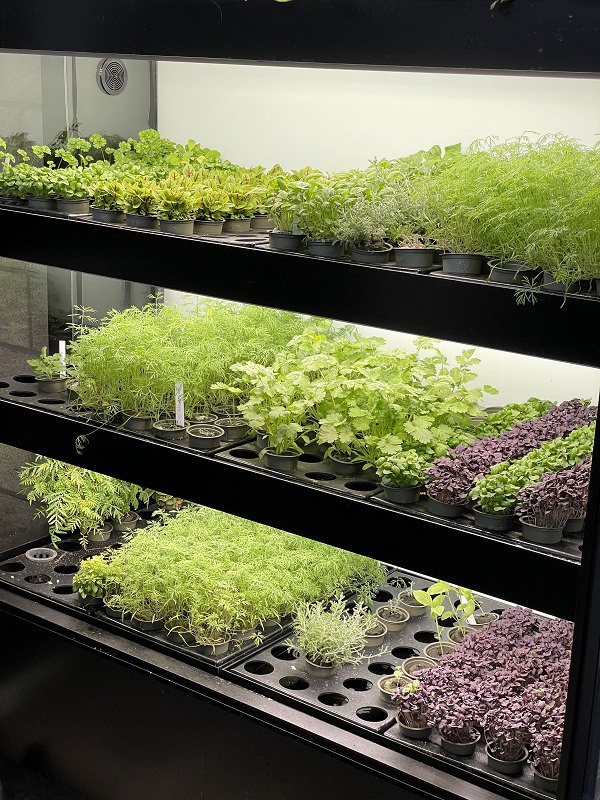
What does an Upfarm unit contain?
- Various light recipes for growing a wide range of herbs.
- A closed water circulation system that circulates nutrient-rich water through the greenhouse to feed the plants. The unused water is collected and reused after filters remove dirt and plant material from it.
- Sensors to set up a microclimate. These sensors monitor water, acidity, and nutrient levels. They check temperature and humidity levels too. That means, for instance, that a Mediterranean climate can be created to grow Italian basil.
“Herbs and nature are inextricably linked. Unfortunately, herbs aren’t always offered in a welcoming way. For example, mint is imported from Morocco or even Asia and packaged in plastic with a limited shelf life. That brings with it enormous ecological pressure. We offer people the chance to grow this mint locally and pesticide-free in an ideal climate."
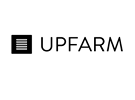 Lode Lauwers
Lode Lauwers
Ufarm
lode@upfarm.be
www.upfarm.be
